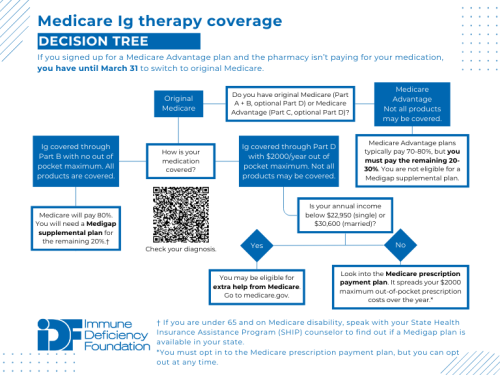
-
Understanding primary immunodeficiency (PI)

Understanding PI
The more you understand about primary immunodeficiency (PI), the better you can live with the disease or support others in your life with PI. Learn more about PI, including the various diagnoses and treatment options.
-
Living with PI
-
Addressing mental health
-
Explaining your diagnosis
- General care
- Get support
- For parents and guardians
-
Managing workplace issues
- Navigating insurance
-
Traveling safely

Living with PI
Living with primary immunodeficiency (PI) can be challenging, but you’re not alone—many people with PI lead full and active lives. With the right support and resources, you can, too.
-
Addressing mental health
-
Get involved

Get involved
Be a hero for those with PI. Change lives by promoting primary immunodeficiency (PI) awareness and taking action in your community through advocacy, donating, volunteering, or fundraising.
-
Advancing research and clinical care
-
Grants
-
IDF surveys
-
Participating in clinical trials
-
Diagnosing PI
-
Consulting immunologist
-
Clinician education

Advancing research and clinical care
Whether you’re a clinician, researcher, or an individual with primary immunodeficiency (PI), IDF has resources to help you advance the field. Get details on surveys, grants, and clinical trials.
-
Grants
Dr. Simon Tabchi, a podiatrist and foot and ankle surgeon, received a bone marrow transplant (BMT) at age 10 as a treatment for Wiskott-Aldrich syndrome (WAS), a rare primary immunodeficiency (PI). Even though the treatment proved curative, decades later, at age 31, when he sought life insurance after his first daughter was born, companies denied him coverage.
“I encountered significant obstacles. Any time they saw that I had WAS as a child and BMT, I got denied right away, even though I had been symptom-free for 20-plus years. I constantly kept looking for agencies,” said Tabchi.
Finally, at age 34, he found a company, Transamerica Agency Network, a financial services company that offers life insurance, that helped him obtain a policy.
“We are constantly plagued by our past illnesses, however, there are companies out there that are willing to help,” said Tabchi. “My advice to others with PI who are seeking life insurance is to keep fighting to get what you want.”
A life insurance policy provides financial protection to those you love at the time of your death. It covers funeral expenses, and other financial obligations like mortgage, car payments, student loans, and care for a loved one with a disability. It can finance your children’s education. Most importantly, it gives your loved ones the time they need to grieve without worrying about how they will cover immediate expenses.
The two main types of life insurance to consider are term and permanent. Term life insurance policies are purchased for specific contractual periods such as 10, 20, or 30 years. When the term ends, the policy expires.
Permanent life insurance policies last your entire life. The premium is usually more expensive, but premiums remain level throughout the duration of the policy.
What makes permanent life insurance unique is that part of your premium pays for your death benefit, another goes to insurance operating costs, and the third part is put toward your policy’s “cash value.” The cash value collects on a tax-deferred basis and can be used for any purpose such as a house down payment, college tuition, retirement, or emergency expenses. However, keep in mind that withdrawing the cash value will reduce the death benefit, so it’s important to pay it back.
Being covered by life insurance is helpful at any age, even in infancy, said David Conroy, vice president of market development and professional development at Transamerica Agency Network.
“New parents should consider life insurance for a child when they are first born. At that point, they don’t have a diagnosis and are protecting their insurability. Once the insurance is in place and the contestability period has been satisfied, the insurance company will pay the policy benefit upon the death of the insured. Be certain to look at any policy limitations,” said Conroy.
What kind of life insurance you buy depends on your financial situation and your objectives. Insurance companies typically perform a needs analysis for prospective clients that may consider costs related to death, income, mortgage, and education. Consider the following questions:
- How much do you need for funeral coverage?
- How much do you need to replace your income?
- How much do you need to pay off your mortgage?
- How much do you need to pay for your children’s education?
“From there, it’s what you can afford. It might be a combination of term life insurance to get some coverage and permanent life insurance. You’ll need to cover expenses when you die but beneficiaries may also need resources,” explained Conroy.
“Even for older folks, we take them through the needs analysis. After 50, you may not need to replace income or mortgage, but you might have to pay off a car. You’re also looking at legacy at that point, assets that you’d like to pass on to your children and grandchildren.”
If an employer offers life insurance free of charge, accept it. Most employer-provided insurance is guaranteed issue, which means the company can’t deny life insurance based on risk factors like your health. Also, find out if it’s portable, meaning you can take it with you even if you leave the job, as long as you keep paying for it.
What if you want to purchase life insurance and you are denied because of your health? To explore your options, seek out a life insurance professional who can offer quotes from multiple companies.
“Make sure you are working with a professional that gives you the ability to compare underwriting across multiple carriers,” said Conroy.
Underwriting in the life insurance industry is the process of assessing a person’s risk when deciding whether to insure or not. Considerations include health habits and hobbies. If someone is a skydiver, for example, obtaining life insurance could be a challenge. When it comes to having a PI, though, that may or may not present a disadvantage.
“All companies do underwriting and all companies have different underwriting rules and nuances,” said Conroy. “Every person that comes to them is unique. Every single person with an immune issue will be looked at individually.”
Wiskott-Aldrich Foundation Executive Director Dr. Sumathi Iyengar, a pediatrician and mother to a son diagnosed with WAS, said in her experience that a person with WAS may be denied life insurance because of health complications caused by WAS or health issues that could develop after being treated with BMT for WAS.
“To me, the biggest barrier that I see is that the life insurance companies don't know that the BMT is curative,” said Iyengar, who added that education in the life insurance industry is the key to helping those with PI obtain policies.
People who are denied life insurance because of their health may appeal the decision, according to Life Happens, a non-profit organization designed to provide education about life insurance. During the appeals process, be sure your doctor provides up-to-date information on your health. If you are still denied, consider seeking out a financial professional who works with multiple companies, explore workplace insurance plans, or consider a modified policy that provides at least some coverage, suggests Life Happens.
Read other newsletter articles
The IDF ADVOCATE is the national newsletter of the Immune Deficiency Foundation, published twice a year. Download or request a free print copy of the newest edition!
Read newsletterSign up for updates from IDF
Receive news and helpful resources to your cell phone or inbox. You can change or cancel your subscription at any time.





The Immune Deficiency Foundation improves the diagnosis, treatment, and quality of life for every person affected by primary immunodeficiency.
We foster a community that is connected, engaged, and empowered through advocacy, education, and research.
Combined Charity Campaign | CFC# 66309




